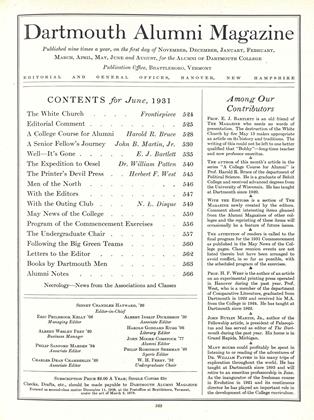By Martin W. Peck, '02 M.D. With an introduction by Bernard Glueck M.D. Alfred Knopf, 1931.
The Meaning of Psychoanalysis is intended to present Freudian psychology to the layman. From this point of view the book is carefully arranged. The first chapter stresses the significance of the concept of the "unconcious" and thus the most interesting and defensible of all the Freudian tenets is impressed upon the reader at the very beginning. A history of psychoanalysis follows in the style of a biography of Freud. The charming quality of Freud's own autobiography is preserved by frequent quotations. One short chapter is devoted to psychoanalysis as a system of psychology and I know of no better treatment in so small a space.
The chapters on treatment are the most interesting. The general subject considered may be described as probing the unconcious in order to discover the genesis of emotionally toned attitudes, which are no longer adequate for adulthood. The techniques, the dangers and the pitfalls in the process of probing are pointed out and their importance evaluated. The Freudian concepts of rapport, transference, and resistance are singled out for discussion. Therapy in psychoanalysis is presented as a re-education of the patient in terms of the increased insight that the patient has obtained into his own character as a result of the analysis.
The book ends with chapters devoted to eases illustrating the method of treatment, as previously described. The psychoanalist at work is presented in some detail. Only two cases are analyzed but with sufficient detail to present a good picture of an actual psychoanalytic situation.
As for the meaning of psychoanalysis in terms of the general impression made upon the reader, I should say that it does not connote the sex implications that one would expect from a follower of Ereud. Freud's theory is presented and Dr. Peck cannot be confused with the growing group of psychoanalysts with Freudian leanings. He is in fact a close disciple of Freud; and yet as books go in psychoanalytic literature this is one of the least sexual. The reason for this may be due to a matter of emphasis in treating the subject matter. The book is really more concerned with psychoanalysis as a therapy rather than as a system of psychology. In fact Dr. Peck's chapters on treatment may be readily taken from the body of the book as a whole and be considered independently of psychoanalytic theory without impairment of the value of the material to the reader. The systemist, on the other hand, by the very nature of his material must stress such details of the analysis that are particularly illustrative of the systematic formulations of psychoanalysis and consequently the treatment acquires an erotic cast.
This book as a whole, therefore, is one that should find favour with those interested in the technique of psychoanalysis. It is written with a clear, non-technical style, and presents psychoanalysis in it's most favourable aspect—the therapeutic, which has usually been obscured by theory or esoteric terminology and rarely done as well as in this treatment by Dr. Peck.
 View Full Issue
View Full Issue
More From This Issue
-
 Class Notes
Class NotesCLASS OF 1930
June 1931 By Albert I. Dickerson -
 Article
ArticleA Senior Fellow's Journey
June 1931 By John Butlin Martin, Jr. -
 Class Notes
Class NotesCLASS OF 1929
June 1931 By F. W. Andres -
 Article
ArticleThe Dartmouth Expedition to the Island of Oesel
June 1931 By Wm. Patten -
 Class Notes
Class NotesCLASS OF 1910
June 1931 -
 Lettter from the Editor
Lettter from the EditorEditorial Comment
June 1931
Books
-
 Books
BooksProfessor J. W. Goldthwait has an article
DECEMBER 1931 -
 Books
BooksAlumni Articles
FEBRUARY 1969 -
 Books
BooksTHE PREVALENCE OF NONSENSE.
NOVEMBER 1967 By JOHN HURD '21 -
 Books
BooksECONOMICS.
MARCH 1970 By LARS G. SANDBERG -
 Books
BooksPlease Note:
APRIL 1984 By P.D.S. -
 Books
BooksMOTIVATION AND VISUAL FACTORS
June 1942 By Theodore Karwoski

